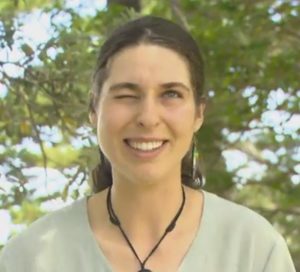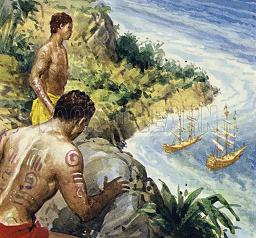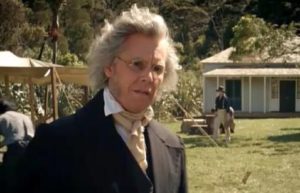1800s: New Zealand Not Quiet
January 21, 2020
By AHNZ
 There were thousands of non-Maori legally coming and going from New Zealand prior to 1840. Very soon after Captain Cook’s (re)discovery, this country became a destination for numerous visitors and of course it was covered by governing laws.
There were thousands of non-Maori legally coming and going from New Zealand prior to 1840. Very soon after Captain Cook’s (re)discovery, this country became a destination for numerous visitors and of course it was covered by governing laws.
Comment to AHNZ: No, there was no “law” at that time so how could they be legal or illegal?
 New Zealand was under New South Wales law prior to the Treaty. The first lawman was assigned in 1814. Trade control was in the hands of the British (specifically, the East India Company) until 1801. Then, in 1803, the Governor of New South Wales exercised his powers to grant similar rights to George Bass in Southland. From now on we became thick with sealers and whalers legally coming and going in their thousands.
New Zealand was under New South Wales law prior to the Treaty. The first lawman was assigned in 1814. Trade control was in the hands of the British (specifically, the East India Company) until 1801. Then, in 1803, the Governor of New South Wales exercised his powers to grant similar rights to George Bass in Southland. From now on we became thick with sealers and whalers legally coming and going in their thousands.
Not to mention, we had explorers from Russia, France, America, Holland, and England. All within their legal rights.
None of the above was illegal activity awaiting a Treaty of Waitangi so that non-Maori people could cross imaginary lines lawfully. The idea of passports is a WW1 (c.1915) phenomena. So, now, get this…
“This is an initiative allowing people to connect with New Zealand’s history.”
“The Treaty of Waitangi is a covenant for non-Maori to enter by law into New Zealand. So the Declaration of Independence and the Treaty are both important. Therefore, we need to learn about them both because they are both what give us Pakeha a place here.”
“Maybe it is to plant the thought that we, non-Maori, are visitors here. So what do visitors do? Maybe it’s to learn. Therefore, learning how to help out as visotors could help us help the people of the land.”- Lillian Murray, Karuwhā Trust
Murray’s idea is ridiculously ahistoric. The idea is proposed that Maoris are the only ‘people of the land’, all else just visiting. Visitors, your job is to shut your gob and learn. Then, do what you can to help the people whose country this is. Then, I suppose, the job of a visitor is to go home again because if you accept that’s what you are isn’t that the logical next step?
“One group is belonging, original, defining, normal; The other is alien, foreigner, defined, strange. Pakeha is a hegemonic term.”- 1835: The Pakeha Slur, AHNZ
She also goes on to recite that the Treaty and Declaration constitute some sort of visa program allowing legal entry into this country. As if all the previous settlers and explorers and industries were not legal before!?
Questions
 What is the Karuwhā Mission Trust?
What is the Karuwhā Mission Trust?
A charity set up in 2005 affiliated with Christianity and, seemingly, Henry Williams whose nick-name was ‘Four Eyes’/’Karu Wha’.
With donations and, I suppose, church money, they run workshops to instruct willing victims in alternative history and law. This includes field trips to Parihaka and Waitangi.
Why do only White People attend these seminars?
Few Maori are involved according to spokesman David Moko because it is Pakeha who most need to come to an understanding not Maori¹.
In attempting to answer a similar question TVNZ’s Scotty Morrison said that Maoris did not attend his courses because of something called “language trauma.”
The Anarchist History answer to the question is that it the market for such propaganda is only with scared white people who lack their own cultural resources to face coming crisis.
Problem: I feel traumatised by attack on my populationCalculation: I estimate which group is most fearsome and likely to conquer the otherIdentification: I radically adopt an identity to match the side calculated to win the fight for supremacy in the hopes they’ll adopt me or go easy on me or at least not kill me- Ref. Converted to Islam after the Mosque Attacks; NZB3
Why is Lillian Murray doing the talking?
Young white women are scared of the future and seeking refuge. A tried and tested strategy is to have a buck each way by affiliating with your own tribe as well as the one you think is strong.
Open to being accepted by the out-group of their society by dressing like them and sending signals allowing them to be included. As such, no matter what side the toast lands when it hits the floor, they’ve got a home to go to. – Ref. Liberals: A Buck Each Way; NZB3
The young woman’s facial ticks are off the charts, especially as she’s trying to recite the nonsense she has been fed about the Treaty and what Pakeha are. What she is. This is a scared woman trying to save herself by believing absurdities for the camera.
I think the organisation are a bit afraid they are speaking absurdities too. David Moko was very vague as if he has spent too much time in tertiary education. By using Lillian as bait (she’s a “volunteer”) it is easy to retract the nonsense they have fed into her if anyone calls them on it. Also, if it is successful then those in responsibility will feel brave enough to say such things in the open themselves.
The hegemony continues.
—
1. “The Treaty of Waitangi is a covenant for non-Māori,”; Lillian Murray; Te Ao Maori.news
One thought on "1800s: New Zealand Not Quiet"
Leave a Reply
 Like Comment Share
Like Comment Share






It takes two to tango